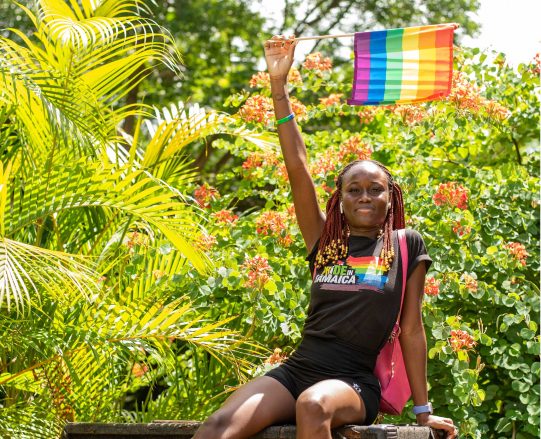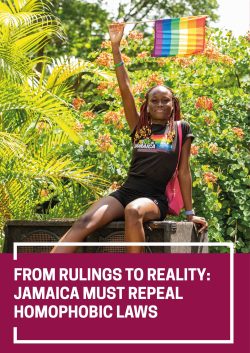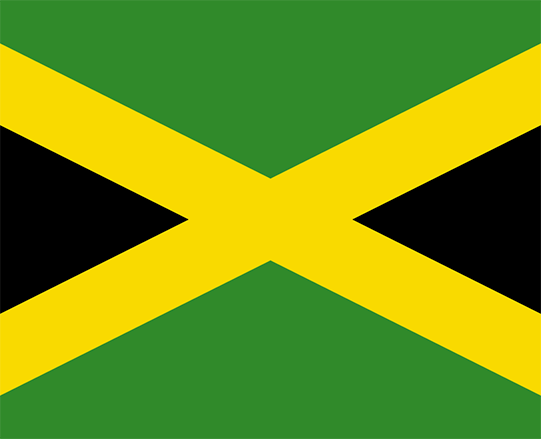On the third anniversary of a landmark decision from the Inter-American Commission on Human Rights (IACHR) urging the Jamaican government to repeal the country’s homophobic laws, the Human Dignity Trust (HDT) calls on Jamaica to take immediate action and end the criminalisation of consensual, same-sex intimacy.
I brought a case to the IACHR with the hope of creating the change that I want to see in Jamaica. Its decision was recognition by the international community of the ongoing human rights abuses suffered by my brothers and sisters – and a call to action for Jamaica
‘This Saturday, 17 February, will mark three years since the publication of the IACHR’s report and recommendations. I call on the Jamaican government to act now to protect the basic human rights of its LGBT citizens,’ added Henry.
Since the IACHR’s decision was made public, Jamaica has failed to show interest in complying with a single recommendation made by the Commission, says HDT. To the contrary, the government last year relied on a savings clause in its constitution to prevent domestic courts from considering a constitutional challenge to the laws that criminalise sexual relations between men.
In the face of this resistance to progress, HDT today released a report, From Rulings to Reality: Jamaica Must Repeal Homophobic Laws, saying violence, harassment and discrimination against LGBT people in Jamaica has persisted over the last three years.
‘As we reach yet another anniversary of the landmark 2021 decision, Jamaica wilfully upholds its outdated and homophobic laws in direct violation of its international human rights obligations,’ says Téa Braun, HDT’s Chief Executive.
‘It’s time for Jamaica to follow in the footsteps of its Caribbean neighbours like Antigua and Barbuda, Barbados and St Kitts and Nevis, and banish these criminalising laws to the history books. Gareth and his fellow LGBT Jamaicans should not be living in fear because of who they are and who they love.’
According to the new report, between 2021 and 2023, the Canadian NGO Rainbow Railroad received 867 requests for assistance from LGBT individuals in Jamaica seeking asylum abroad. In a 2023 national LGBT survey, a large majority (73%) of respondents expressed fear of being assaulted, threatened or harassed purely based on their sexual orientation or gender identity and expression.
Discrimination against LGBT Jamaicans also goes beyond criminalising laws. The fear of stigma and criminalisation impedes access to health services and emboldens landlords to target LGBT people with refusals to rent, excessively high rents and eviction.
In 2011, represented by HDT and its pro bono legal team, Jamaican citizens Gareth Henry and Simone Edwards successfully sought a declaration that Jamaica was violating their rights under the American Convention on Human Rights. Their petition claimed that sections 76, 77 and 78 of the Offences Against the Person Act, which criminalise private consensual sexual intimacy between males, fuelled the discrimination, threats, violence and lack of State protection that Henry and Edwards faced, forcing them to flee Jamaica and claim refugee protection abroad.
Ten years later, after a lengthy delay caused by backlog at the IACHR, the Commission published its decision, finding that Jamaica is in direct violation of its legal obligations under the American Convention on Human Rights. The IACHR urged Jamaica to repeal the offending provisions, and also issued recommendations to the Jamaican government, including the enactment of anti-discrimination legislation and the collection of data on discrimination and violence against the LGBT community.
Notes to editors
- Read the new report, From Rulings to Reality: Jamaica Must Repeal Homophobic Laws
- For more information on the criminalisation of consensual same-sex sexual intimacy in Jamaica on our country profile
- The Human Dignity Trust uses the law to defend the human rights of LGBT people globally. We envisage a world in which LGBT people are free from criminalisation and enjoy protection in law, by supporting strategic litigation and law reform.
- For further information or to arrange interviews, please contact:
X: @HumanDignityT




